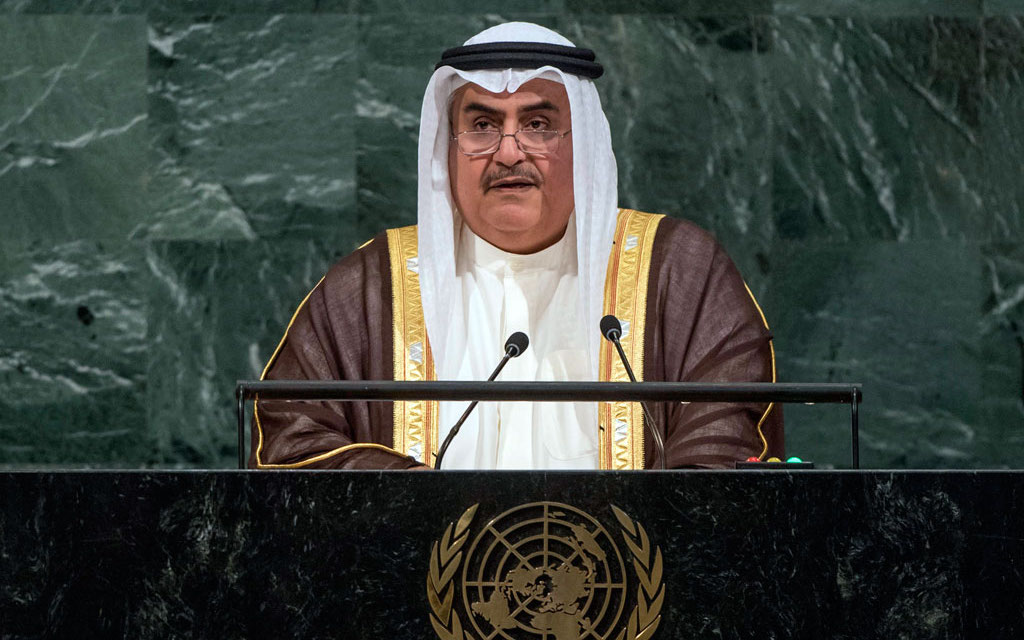25 September 2017 – On Saturday, 23 September, Bahrain’s Minister of Foreign Affairs, Sheikh Khalid bin Ahmed bin Mohamed Al Khalifa, addressed the 72nd Session of the United Nations General Assembly in New York. In his intervention, the Minister made generic statements about Bahrain’s desire for a strong Middle East, positive relations with other countries, and support for the principle of non-interference in others’ internal affairs. However, the Foreign Minister did not once make reference to Bahrain’s human rights record or the concerns raised about it during the ongoing 36th session of the UN Human Rights Council in Geneva. Americans for Democracy & Human Rights in Bahrain calls for human rights to remain central to Bahrain’s engagement with the UN and the international community, and is disheartened by the lack of attention given to this issue by the Bahraini delegation to the General Assembly.
Mr. Al Khalifa’s remarks relating to human rights focused primarily on platitudes regarding a more stable and prosperous world and international collaboration on programs such as the United Nations Sustainable Development Goals. He claimed that Bahrain has made credible efforts to eliminate human trafficking and forced labor while enhancing the participation of youth and women in international development, and that there are plans for future collaboration in this field with the UN. Despite such statements stressing the government’s willingness to cooperate with the UN and the international community’s calls to do so, the Foreign Minister avoided any direct mention of the crucial question of Bahrain’s human rights record. The address made no clear reference to the human rights situation in the country, or to relevant cases such as the 99 workers who remain dismissed from their jobs because of their alleged participation in strikes and pro-democracy protests.
Earlier last week, UN High Commissioner for Human Rights Zeid Ra’ad Zeid al-Hussein raised concerns about the deteriorating human rights situation in Bahrain and the government’s efforts to conceal human rights violations perpetrated by its own security forces. Despite Bahrain’s claims that it is willing to engage with the UN, the High Commissioner said that his efforts to assist “have been met with point-blank denials, unfounded accusations and unreasonable last-minute conditions to technical missions. But no public relations campaign can paper over the violations being inflicted on the people of Bahrain.” Moreover, Bahrain has not permitted a single UN Special Procedures mandate-holder to enter the country since 2006, despite numerous and repeated requests by a wide range of mandate-holders. In particular, Bahrain has repeatedly postponed the Special Rapporteur on Torture’s scheduled visit, and has yet to reschedule after the last planned visit was effectively cancelled in 2012.
“Human rights need to remain a focus at international forums like the United Nations General Assembly, where Bahrain speaks in circles around the issue, avoiding all mention of its outrageous violations,” said Husain Abdulla, ADHRB’s Executive Director. “Bahrain’s lack of cooperation with the High Commissioner and refusal to directly mention its human rights record is an attempt to cover up the ongoing human rights crisis in the Kingdom. We hope that, like the High Commissioner in Geneva, UN Member States in New York will be more forward in addressing these abuses at the United Nations and call for Bahrain to put an end to them.”
ADHRB calls on states to address human rights abuses at the upcoming session of the General Assembly’s Third Committee in October – where the UN High Commissioner for Human Rights and the different Special Procedures will take part – and to further contribute to highlighting Bahrain’s human rights crisis. The first step must be ceasing all reprisals against Bahraini civil society for engaging with UN human rights mechanisms. We further call on the Government of Bahrain to address directly the human rights situation in the country and to actively cooperate with the UN and the international community in this field.





